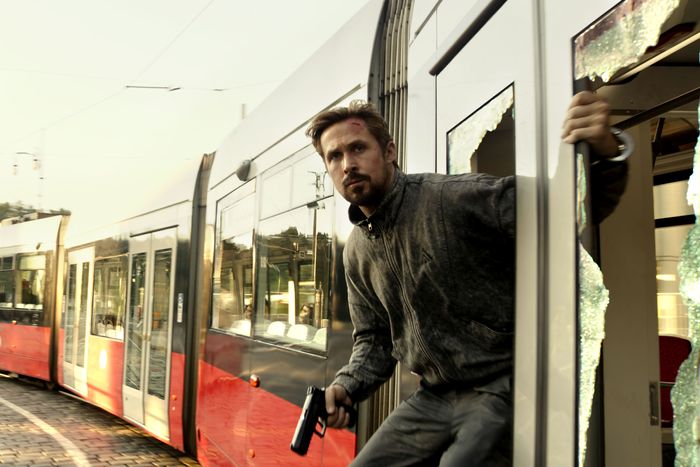
The gray man, played by Ryan Gosling, is an off-books government killer whose real name is Court Gentry, which sounds fake enough (Beau Monde Patrician? Noble Fancyperson?) to make the idea of a code name feel a little superfluous. But he has one of those, too: Sierra Six, which is a reference to the CIA program he’s recruited into at the start of the movie as well as a not-so-subtle nod to a certain globe-trotting spy. “007 was taken,” Six even quips at one point, and if openly pointing out that you’re a knockoff version of a famous character would feel like hubris in most other movies, well, The Gray Man is a Netflix original, and churning out brand-new properties that feel a lot like things you’ve seen before has become the streaming giant’s main jam. And in many ways, it sums up what Netflix is now pinning its cinematic future on.
Adapted from the first of a series of books by Mark Greaney, it’s meant to launch a franchise, and it’s directed by Marvel veterans the Russo brothers. It’s also the most expensive movie Netflix has ever made, though a huge part of that reported $200 million budget surely went to hefty payouts for Gosling (who hasn’t appeared in a movie since First Man in 2018), Chris Evans, and Ana de Armas. What’s left has been used to make something perfectly serviceable to leave on in the background while noodling on your phone, and I mean that as a compliment. Netflix’s previous attempt at an extravagantly priced star-driven action movie, Red Notice, felt like it was written by an AI and performed in front of green screens without ever requiring its stars to be in the same room. The Gray Man at least feels like a middling studio movie that wasn’t worth catching in theaters but that would comfortably fill an afternoon if you stumbled on it airing on cable.
He’s not actually very Bond-like, Six, despite the movie’s clear aspirations to be seen in that tradition. He falls somewhere between Jason Bourne and the title character in La Femme Nikita, a willing recruit to a secret program he doesn’t have a way to opt out of. When he’s first approached by a CIA bigwig named Fitzroy (Billy Bob Thornton), he’s in the midst of serving a life sentence in prison. Fitzroy tells him he’ll be trained “to kill bad guys,” and he says yes. Cut to an 18-years-later title card and he’s in Bangkok about to rendezvous with agent Dani Miranda (de Armas) at the behest of a Langley up-and-comer named Carmichael (Bridgerton’s Regé-Jean Page), who turns out to have nefarious intentions. Six’s intentions are less clear. Like all assassins, apparently, he has a heart of gold, but it only emerges when his own survival is placed at risk due to interagency politicking. He has a Bourne-like capacity for brutality and for weathering serious injuries, and the movie has a tendency to throw him into situations where he has to fight hand-to-hand, which admittedly end up looking better than the shootout sequences. But he also has a very un-Bourne-like tendency to crack jokes.
The Gray Man, which was scripted by Joe Russo, Christopher Markus, and Stephen McFeely, is written like a comedy but never really played like one. Gosling laconically underdelivers wisecracks that would be unbearable if he leaned into them. “Where are you?” someone barks at him on the phone. “Emotionally?” he replies. I’ve missed him onscreen, and even when he’s operating in low-power mode, he makes enough unpredictable choices to be interesting. Evans makes up for him energy-wise and more, smirking his way through the role of the cartoonishly sociopathic Lloyd Hansen, a mustachioed private contractor hired by Carmichael whose preferred method of sending troops of armed men to shoot up very public space makes him seemingly unsuited for covert work. The movie spends a lot of time in a tonal purgatory where it’s never clear if it’s meant to be funny, and while its banter isn’t generally good enough for that to matter, it does end up undercutting the best gag, which is that Lloyd and Carmichael met not doing untoward fieldwork in the Balkans or something but at Harvard.
The plot, as much as there is one, involves a MacGuffin — a drive with incriminating evidence hidden inside a medallion — that takes the action from Turkey to Austria to the Czech Republic to Croatia with a stop in flashbacks to Hong Kong. De Armas is relegated again to a gal Friday role, with Alfre Woodard playing the small part of a retired CIA chief. Tamil celeb Dhanush is a mysterious mercenary in the kind of overtly pandering appearance that used to be reserved for Chinese stars meant to lure in international audiences (there’s no Netflix in China, but there is in India, a huge market the company has been struggling to capture). For all the movie’s resources, though, the big set pieces are depressingly incoherent. The Russos may have been responsible for one of the better fight scenes in the MCU, in the elevator in Captain America: The Winter Soldier, but here, they stage prolonged action sequences on a crashing plane and a moving tram that are boosted with sloppy computer-generated work and so little sense of where the characters are in relation to the spaces they’re in that there’s no tension at all.
Not that it matters. The Gray Man wraps up the way a TV pilot would, with shockingly little resolution and most of the characters returned to their starting positions to do this all over again in the inevitable sequel. It’s good enough for government work, but you understand why they might want to keep the numbers hush-hush.


